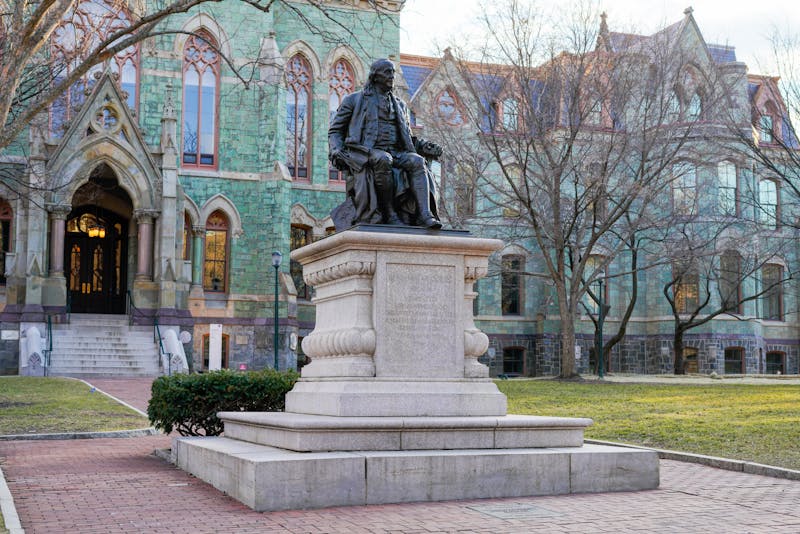
Craig Carnaroli, Penn senior executive vice president, wrote an op-ed in response to the protests on the sale of the UC Townhomes.
Credit: Oscar VasquezPenn has broken its silence on the sale of the University City Townhomes after months of protests, announcing a series of actions to address the broader lack of affordable housing in Philadelphia.
In a Sept. 29 op-ed published in The Daily Pennsylvanian, Penn Senior Executive Vice President Craig Carnaroli wrote that Penn does not own the UC Townhomes property and does not have “any influence” over its redevelopment. He also announced, however, that Penn will take actions to address the supply of affordable housing in Philadelphia, describing the UC Townhomes as “emblematic of a long and tangled history” of city, state, and federal inaction.
Penn will partner with Rebuilding Together Philadelphia, a local community revitalization organization, to provide funding over four years to assist approximately 75 West Philadelphia low-income homeowners. In addition, administrators have asked faculty at the Penn Institute for Urban Research to produce a “comprehensive study” with “actionable strategies” on how the University can support the increase of affordable housing and determine “best practices” for partnerships between the University and the West Philadelphia community.
Carnaroli wrote that the current scarcity of low-cost housing in Philadelphia “calls for innovative partnerships” between the local, state, and federal government in addition to stakeholders such as Penn and nearby anchor institutions.
Rebuilding Together Philadelphia is an organization that brings volunteers, community partners, and communities together to repair owner-occupied houses in vulnerable neighborhoods so that they are safe, healthy, and energy efficient.
Among its programs, the organization repairs over 75 homes in a neighborhood each year as part of “Block Build” events, repairs homes for homeowners age 55 or older at no cost in economically important “middle neighborhoods," repairs homes to remove factors that can trigger asthma, and matches students with opportunities to repair homes for seniors and build their technical and soft skills.
At the same time, Penn is also calling on faculty with expertise in affordable housing and community development to contribute knowledge and ideas.
Carnaroli added that the University wants to engage with its neighbors and community partners to confront the current crisis to fulfill its responsibilities as “a world-class university and a local anchor institution” and that the administration is “open and committed to productive dialogue on these important and complex issues.”
In response to Carnaroli’s op-ed, Save the UC Townhomes criticized his statements, citing an article in the Philadelphia Business Journal in which Carnaroli said that Penn was looking to "densify" University City to propel life sciences development.
Tony Sorrentino, Associate Vice President in the Office of the Executive Vice President, said that the response took Carnaroli’s quotes from the business journal out of its original context. He added that the conversations about the UC Townhomes and the life sciences development were separate matters.
“What [Carnaroli] was saying was the existing buildings that we have may not be dense enough, and we might have to add on top of them and build up. That way you can get more square footage without taking existing land,” Sorrentino said. “It was framed as if one was at the expense of the other.”
The organization also wrote that, while Penn’s new agreement will provide funding for approximately 75 homeowners, the UC Townhomes consist of 70 units that are currently being displaced — implying that Penn should directly support the UC Townhomes.
“[T]hey won't meet a second time with Save the UC Townhomes,” the group wrote on Twitter. “Penn admin [is] taking zero responsibility for its history of displacing the Black Bottom and low-income West Philly — casting Save the UC Townhomes and student supporters as ill-informed.”
Carnaroli’s op-ed and Save the UC Townhomes’ response come at the forefront of a months-long conflict over the impending sale of the UC Townhomes.
"Some residents, along with some Penn faculty, students, and staff, are disillusioned by these events, and have manifested this through numerous protests to raise awareness of the plight of those living in the Townhomes," Carnaroli wrote. "And on a few occasions, these protests have been directed at the University. As a bordering neighbor to the Townhomes, we share these sentiments."
Editor's Note: This article has been updated to reflect missing context for Penn Senior Executive Vice President Craig Carnaroli's quote in the Philadelphia Business Journal about densifying University City to promote life science development.
The Daily Pennsylvanian is an independent, student-run newspaper. Please consider making a donation to support the coverage that shapes the University. Your generosity ensures a future of strong journalism at Penn.
Donate






